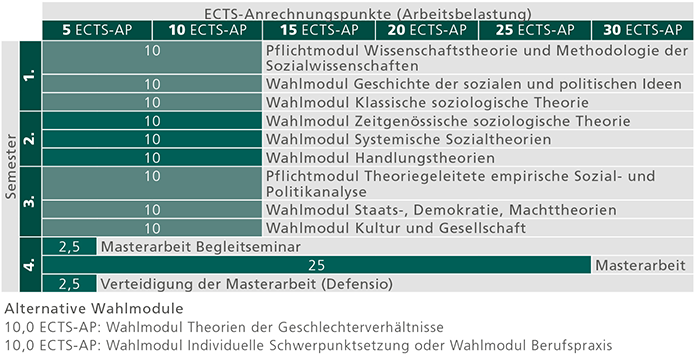Masterstudium Soziologie: Soziale und Politische Theorie
Curriculum (2008W)
Master of Arts
Dauer/ECTS-AP
4 Semester/120 ECTS-AP
Studienart
Vollzeit
Unterrichtssprache
Deutsch
Voraussetzung
Bachelorabschluss/Äquivalenter Abschluss und Sprachnachweis
Fakultät
Fakultät für Soziale und Politische Wissenschaften
Niveau der Qualifikation
Master (2. Studienzyklus)
ISCED-11: Stufe 7, EQR/NQR: Stufe 7
ISCED-F
0388 Interdisziplinäre Programme und Qualifikationen mit dem Schwerpunkt
Sozialwissenschaften, Journalismus und Informationswesen
Studienkennzahl
UC 066 905
Das Curriculum ist die Grundlage eines Studiums. Mit einem Blick auf das Curriculum zum Master Soziologie: Soziale und politische Theorie erhältst du einen detaillierten Überblick zu Aufbau, Inhalt, Prüfungsordnung und Qualifikationsprofil dieses Masters.
Durch das Curriculum können mehrere wichtige Fragen bereits vor Studienbeginn geklärt werden. Zum Beispiel welche Kriterien für die Anmeldung zum Masterstudium Soziologie: Soziale und politische Theorie erfüllt werden müssen, wie lange das Studium dauert, welche Module zu absolvieren sind und vieles mehr.
Für das Masterstudium Soziologie: Soziale und politische Theorie gilt aktuell das Curriculum 2008W.
Informationen zum Curriculum (2008W)
Die Gesamtfassung des Curriculums spiegelt das aktuell gültige Curriculum wider, ist rechtlich unverbindlich und dient lediglich der Information. Die rechtlich verbindliche Form des Curriculums inkl. etwaiger Änderungen finden Sie in den entsprechenden Mitteilungsblättern.
Die Information, welche Curriculumsversion für Sie gilt, entnehmen Sie bitte Ihrem Studienblatt
abrufbar unter: https://lfuonline.uibk.ac.at/public/lfuonline_meinestudien.studienblatt
Spalte: Curriculum in der geltenden Fassung
- Mitteilungsblatt vom 05.05.2021, 62. Stück, Nr. 715 (Berichtigung des Curriculums)
- Curriculum/Gesamtfassung (ab 01.10.2020)
- Mitteilungsblatt vom 23.07.2020, 43. Stück, Nr. 492 (Änderung des Curriculums)
- Curriculum/Gesamtfassung (ab 01.10.2019)
- Mitteilungsblatt vom 28.06.2019, 67. Stück, Nr. 593 (Änderung des Curriculums)
- Curriculum/Gesamtfassung (ab 01.10.2014)
- Mitteilungsblatt vom 10.09.2014, 46. Stück, Nr. 663 (Äquivalenzliste)
- Mitteilungsblatt vom 27.06.2014, 36. Stück, Nr. 541 (Änderung des Curriculums)
- Mitteilungsblatt vom 19.02.2008, 21. Stück, Nr. 188
Voraussetzung
Fachlich infrage kommende Bachelorstudien an der Universität Innsbruck:
Nachweis der Allgemeinen Universitätsreife:
Die allgemeine Universitätsreife für die Zulassung zu einem Masterstudium ist durch den Abschluss eines fachlich in Frage kommenden Bachelorstudiums, eines anderen fachlich in Frage kommenden Studiums mindestens desselben hochschulischen Bildungsniveaus an einer anerkannten inländischen oder ausländischen postsekundären Bildungseinrichtung oder eines im Curriculum des Masterstudiums definierten Studiums nachzuweisen. Zum Ausgleich wesentlicher fachlicher Unterschiede können Ergänzungsprüfungen (maximal 30 ECTS-AP) vorgeschrieben werden, die bis zum Ende des zweiten Semesters des Masterstudiums abzulegen sind. Das Rektorat kann festlegen, welche dieser Ergänzungsprüfungen Voraussetzung für die Ablegung von im Curriculum des Masterstudiums vorgesehenen Prüfungen sind.
Im Zuge des Nachweises der Allgemeinen Universitätsreife wird jedenfalls die Absolvierung folgender Kernbereiche im Rahmen des abgeschlossenen Bachelorstudiums geprüft:
- 15 ECTS-AP aus dem Kernbereich Allgemeine soziologische Theorie
- 9 ECTS-AP aus dem Kernbereich spezielle Soziologie (inkl. Gender)
- 15 ECTS-AP aus dem Kernbereich Methoden der empirischen Sozialforschung (inkl. Statistik)
Empfohlener Studienverlauf
Der unten angeführte, exemplarische Studienverlauf gilt als Empfehlung für Vollzeitstudierende, die das Studium im Wintersemester beginnen. Die Aufstellung dient der Darstellung eines möglichen Studienablaufs und ist nicht verpflichtend. Etwaige Prüfungswiederholungen bzw. deren studienzeitverzögernde Wirkung sind nicht berücksichtigt.
Die Regelstudienzeit beträgt 4 Semester bzw. 120 ECTS-AP, wobei gemäß Universitätsgesetz die Arbeitsbelastung eines Studienjahres 1.500 (Echt-)Stunden zu betragen hat und dieser Arbeitsbelastung 60 Anrechnungspunkte zugeteilt werden (ein ECTS-Anrechnungspunkt entspricht einer Arbeitsbelastung der Studierenden von 25 Stunden).
10,0 ECTS-AP: Pflichtmodul Wissenschaftstheorie und Methodologie der Sozialwissenschaften
10,0 ECTS-AP: Wahlmodul Geschichte der sozialen und politischen Ideen
10,0 ECTS-AP: Wahlmodul Klassische soziologische Theorie
10,0 ECTS-AP: Wahlmodul Zeitgenössische soziologische Theorie
10,0 ECTS-AP: Wahlmodul Systemische Sozialtheorien
10,0 ECTS-AP: Wahlmodul Handlungstheorien
10,0 ECTS-AP: Pflichtmodul Theoriegeleitete empirische Sozial- und Politikanalyse
10,0 ECTS-AP: Wahlmodul Staats-, Demokratie, Machttheorien
10,0 ECTS-AP: Wahlmodul Kultur und Gesellschaft
2,5 ECTS-AP: Masterarbeit Begleitseminar
25,0 ECTS-AP: Masterarbeit
2,5 ECTS-AP: Verteidigung der Masterarbeit (Defensio)
10,0 ECTS-AP: Wahlmodul Theorien der Geschlechterverhältnisse
10,0 ECTS-AP: Wahlmodul Individuelle Schwerpunktsetzung oder Wahlmodul Berufspraxis

| Semester | ECTS-AP | Titel |
|---|---|---|
Wahlpaket
Im Rahmen des Masterstudiums kann ein Wahlpaket im Umfang von 30 ECTS-AP absolviert werden.
Weiterführende Informationen bzw. eine Liste möglicher Wahlpakete sind abrufbar unter:
https://www.uibk.ac.at/studium/angebot/wahlpakete/
Erweiterung des Studiums
Im Rahmen dieses Studiums kann das Erweiterungsstudium Entrepreneurship im Umfang von 45 ECTS-AP absolviert werden. Die Zulassung zur Erweiterung setzt die Zulassung zu einem oder den bereits erfolgten Abschluss eines ausgewählten Studiums voraus. Weitere Informationen sind abrufbar unter: https://www.uibk.ac.at/studium/angebot/es-entrepreneurship
Informationen zur Prüfungsordnung inkl. Bewertung und Benotung
Prüfungsordnung
Die Prüfungsordnung ist integraler Bestandteil des Curriculums, detaillierte Informationen finden Sie unter dem Paragrafen Prüfungsordnung.
Bei der Notenverteilungsskala handelt es sich um die statistische Darstellung der Verteilung aller positiv absolvierten Prüfungen, die innerhalb eines Studiums bzw. eines Studienfaches (unter Heranziehung aller gemeldeten Studierenden eines Studiums bzw. eines Studienfaches) erfasst wurden. Die Notenverteilungsskala wird in regelmäßigen Abständen aktualisiert.
| Österreichische Notenskala | Definition | %-Satz | ||
| 1 | SEHR GUT | 52,8 | = 100% | |
| 2 | GUT | 33,9 | ||
| 3 | BEFRIEDIGEND | 10,1 | ||
| 4 | GENÜGEND | 3,2 | ||
| 5 | NICHT GENÜGEND |
März 2025
Gesamtbeurteilung der Qualifikation
Nicht zutreffend
Erklärung: Eine Gesamtbeurteilung (mit Auszeichnung bestanden, bestanden, nicht bestanden) wird nur über eine studienabschließende Prüfung, die aus mehr als einem Fach besteht, vergeben (im Curriculum dieses Studiums ist diese nicht vorgesehen).
Formulare
- Praxisvereinbarung
- Prüfungsprotokoll
- Beurteilung des Pflichtmoduls: Vorbereitung Masterarbeit
- Deckblatt der Masterarbeit
- Antrag um Zulassung zur dritten und vierten Wiederholung einer Lehrveranstaltungsprüfung
Formulare und Ablauf der Einreichung der Masterarbeit (gültig seit 01.11.2023)
Anerkennungen
- Ansuchen um Anerkennung von Prüfungen UND Beiblatt
ACHTUNG: Füllen Sie bitte das Formular "Ansuchen um Anerkennung von Prüfungen" UND das "Beiblatt Soziale und politische Theorie" aus!
Kontakt und Information
Prüfungsreferat
Standort Universitätsstraße 15
Studienbeauftragte (ab 02.07.2025)
Mag. Dr. Bernadette Müller Kmet
Studiendekan (ab 01.03.2024)
Univ.-Prof. Dr. Wilhelmus Johannes Gerardus Uunk
